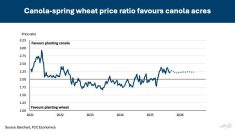Reuters – A group of U.S. Republican senators asked the Environmental Protection Agency to consider a general waiver that would prevent an increase in biofuel blending obligations next year for oil refiners hit by a collapse in fuel demand because of the coronavirus pandemic.
Senators including Shelley Moore Capito of West Virginia and Ted Cruz from Texas said the waiver for 2021 would help refiners cope with the pandemic, which has pushed gasoline demand down more than 10 per cent from year-ago levels.
U.S. laws require the refining industry to blend increasing amounts of biofuels into their fuels each year, requirements that have helped farmers by creating a huge market for corn-based ethanol, but which refiners say is costly.
Read Also

Canada seventh-most influential country on agri-food
Report from Dalhousie University and MNP shows Canada ranks seventh among G20 countries on agri-food influence.
The senators also urged EPA to ensure blending obligations do not exceed the so-called “blend wall” of 10 per cent ethanol in the fuel pool. Most ethanol-blended gasoline sold at retail pumps has a 10 per cent cap on the biofuel because some vehicles cannot use gasoline with higher ethanol blends.
That could mean reducing mandated blending volumes, if overall fuel demand drops enough, the senators argued.
The letter comes after Trump’s EPA handed a major victory to ethanol producers last month, siding with them over oil refiners in an ongoing dispute over the obligations. EPA rejected scores of requests from refiners for waivers that would have retroactively spared them from blending obligations.














